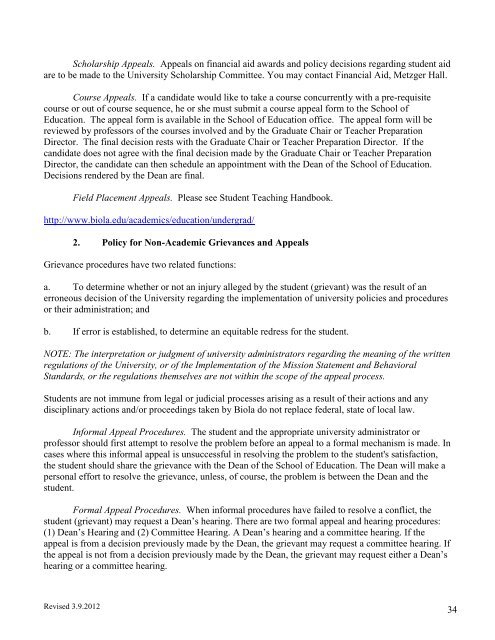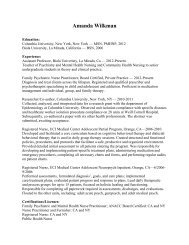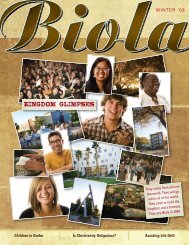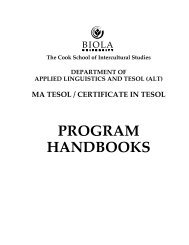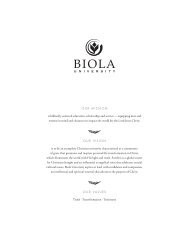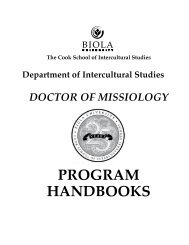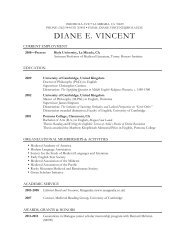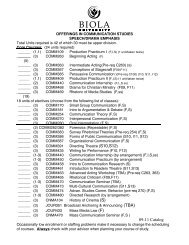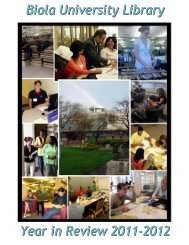GRADUATE STUDENT HANDBOOK - Biola University
GRADUATE STUDENT HANDBOOK - Biola University
GRADUATE STUDENT HANDBOOK - Biola University
Create successful ePaper yourself
Turn your PDF publications into a flip-book with our unique Google optimized e-Paper software.
Scholarship Appeals. Appeals on financial aid awards and policy decisions regarding student aid<br />
are to be made to the <strong>University</strong> Scholarship Committee. You may contact Financial Aid, Metzger Hall.<br />
Course Appeals. If a candidate would like to take a course concurrently with a pre-requisite<br />
course or out of course sequence, he or she must submit a course appeal form to the School of<br />
Education. The appeal form is available in the School of Education office. The appeal form will be<br />
reviewed by professors of the courses involved and by the Graduate Chair or Teacher Preparation<br />
Director. The final decision rests with the Graduate Chair or Teacher Preparation Director. If the<br />
candidate does not agree with the final decision made by the Graduate Chair or Teacher Preparation<br />
Director, the candidate can then schedule an appointment with the Dean of the School of Education.<br />
Decisions rendered by the Dean are final.<br />
Field Placement Appeals. Please see Student Teaching Handbook.<br />
http://www.biola.edu/academics/education/undergrad/<br />
2. Policy for Non-Academic Grievances and Appeals<br />
Grievance procedures have two related functions:<br />
a. To determine whether or not an injury alleged by the student (grievant) was the result of an<br />
erroneous decision of the <strong>University</strong> regarding the implementation of university policies and procedures<br />
or their administration; and<br />
b. If error is established, to determine an equitable redress for the student.<br />
NOTE: The interpretation or judgment of university administrators regarding the meaning of the written<br />
regulations of the <strong>University</strong>, or of the Implementation of the Mission Statement and Behavioral<br />
Standards, or the regulations themselves are not within the scope of the appeal process.<br />
Students are not immune from legal or judicial processes arising as a result of their actions and any<br />
disciplinary actions and/or proceedings taken by <strong>Biola</strong> do not replace federal, state of local law.<br />
Informal Appeal Procedures. The student and the appropriate university administrator or<br />
professor should first attempt to resolve the problem before an appeal to a formal mechanism is made. In<br />
cases where this informal appeal is unsuccessful in resolving the problem to the student's satisfaction,<br />
the student should share the grievance with the Dean of the School of Education. The Dean will make a<br />
personal effort to resolve the grievance, unless, of course, the problem is between the Dean and the<br />
student.<br />
Formal Appeal Procedures. When informal procedures have failed to resolve a conflict, the<br />
student (grievant) may request a Dean‘s hearing. There are two formal appeal and hearing procedures:<br />
(1) Dean‘s Hearing and (2) Committee Hearing. A Dean‘s hearing and a committee hearing. If the<br />
appeal is from a decision previously made by the Dean, the grievant may request a committee hearing. If<br />
the appeal is not from a decision previously made by the Dean, the grievant may request either a Dean‘s<br />
hearing or a committee hearing.<br />
Revised 3.9.2012 34


